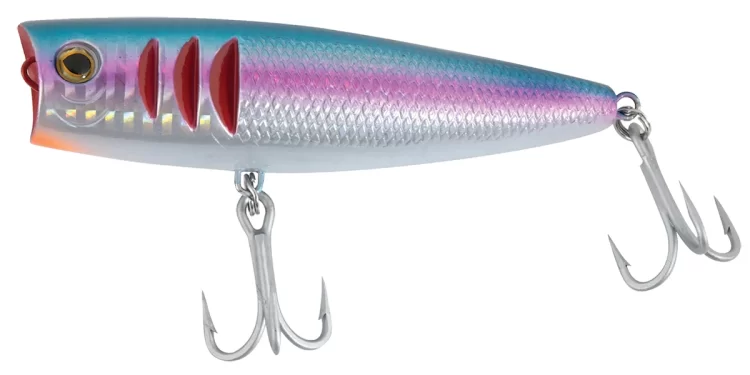Nothing’s more exciting than surface strikes from big fish. Here’s how to do it.
Twitch, pop, smash! Fishing with surface poppers makes the catch exciting. Just three cranks of my reel handle was all it took to make the five-inch-long blue-and-white popper vanish from the surface in a boil the size of a bushel basket. Instantly, my heart began to race, my rod doubled over, and my eyes quickly scanned the perimeter to determine if I had enough space between a partially submerged boulder and a rickety old boat dock to turn the muscular 30-pound striper at the end of my line.
Fortunately, the full-shouldered bass turned tail after inhaling my lure and split the difference between the potential line-cutting structures as it made a mad dash for the main channel and deeper water. There, she would make increasingly shorter runs until eventually relenting at the port stern. With a scoop of the landing net and a twist of my pliers, she was on her way again to maybe make some other angler’s day later in the season.
Explosive Strikes
Like many anglers, I absolutely love targeting big fish with surface poppers. There’s just something about a lure making a commotion atop the water that draws the ire of serious game fish, resulting in explosive strikes that live forever in our memories.
And it’s not just stripers that possess a penchant for zeroing in on these lures. Bluefish, snook, jacks, weakfish, sea trout, redfish, and a host of other predatory species will take a shot at them too. In recent years, nearshore and offshore anglers have even learned to battle tuna on poppers cast with stand-up gear. You really want a thrill? Try battling an enraged 300-pound bluefin that has just smashed your reinforced popper with a vengeance and left behind a swirl the size of a Volkswagen Beetle. Talk about tough battles, heart-thumping workouts, and yes, occasional broken lines!
For decades, early June was my favorite spring slot for pursuing surface action. In recent years, however, as water temperatures have continued to rise, the peak of that action seems to have shifted to May. Both months are still productive, but I give May the edge because southern and Gulf Coast waters are still cool enough for solid morning and evening action while the mid-Atlantic and Northeast is building toward peak action soon after Mother’s Day.
Subscribe Here For Weekly Updates
No matter where you fish, being ready to take advantage of surfacing or blitzing predators helps you make the best of the bite. Often, fish will surface only for a few minutes, making every cast critical. Keep a spinning setup rigged and ready to go at a moment’s notice when cruising in waters where you’ve recently seen predators busting the surface, and you’ll be a step ahead of the game.
Frequently, terns and ’gulls provide a tip-off to potential action, squawking, fighting and diving as they attempt to scoop up pieces of baitfish left behind in surface-feedings frays. In fact, you’ll generally spot the birds diving before you spot the fish boiling. Flat-out surface riots often occur at the mouths of inlets, rivers, and creek mouths, on channel edges paralleling flats adjacent to the back of inlets, and in more open waters at the head of significant rips, off prominent points and just beyond the surf line. Tuna possibilities tend to be much further offshore, of course, but recent years have seen some excellent action within five miles of the beach, especially between southern Massachusetts and eastern Long Island, New York.
Quieter but surprisingly reliable surface action can also be found in back bay areas. Start your searches in four- to six-foot depths while keeping an eye on nearby flats. In this situation, you may spot tail tips extending slightly above the surface in as little as a foot of water as redfish, snook, stripers, or gator blues tip downward to root for crabs or shrimp.
Fishing with Surface Poppers: Which to Choose
For my money, four popper color choices outperform the rest. Although many poppers come in natural patterns, I still like white as a search bait. For bluefish, jacks, sea trout, and weakfish, yellow has always been a great choice. Bone is hard to beat for stripers, and blue reigns supreme when mullet, bunker, or pilchards are in abundance.
When big fish hit on top, casting poppers is the way to challenge them—and yourself. The sight of a huge fish crashing on your lure can send shivers down your spine, make your hands shake, and cause you to forget such simple tasks as flipping open the bail before casting. In short, they make you feel like a kid again. The time is now to get out there and soak up the glory.
-by Tom Schlichter















